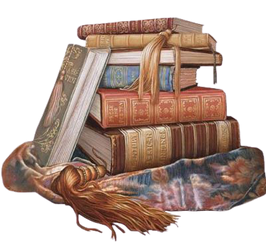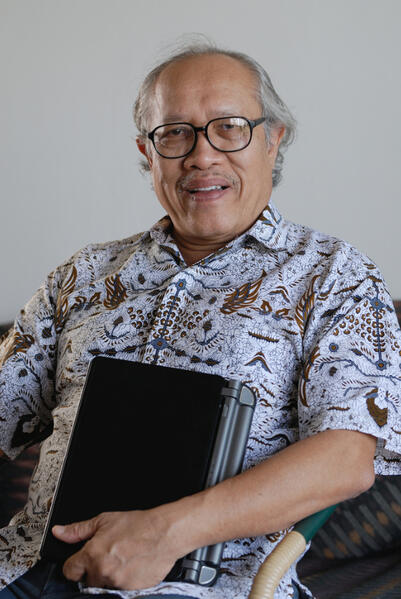LITERATURE EXHIBITION
MALAY CLASSICS
Classical Malay
Literature

Classical Malay literature, also known as traditional Malay literature, refers to the Malay-language literature from the Malay world, consisting of areas now part of Brunei, Malaysia, and Indonesia; works from countries such as the Philippines and Sri Lanka have also been included. It shows considerable influences from Indian literature (such as in the tales of Ramayana and Mahabharata) as well as Arabic and Islamic literature (including tales of the prophet Muhammad and his companions). The term denotes a variety of work, including the hikayat, poetry (in two major forms, the syair and the pantun), history, etc.

Poppies by Usman Awang
From blood, from pus that rots in the soil,
from skeletons that have lost their lives,
snatched by weapons,
the result of war maniacs who kill love,
the red flowers bloom beautifully, requesting to be adored.
Those who live on are remnants of life, full of sufferings,
wizened, bent, deformed, maimed and blind,
war in retrospect is full of horrors;
they remember now, in bitterness, in solitude.
Others lost children, husbands and sweethearts,
lost their sources of support, their livelihood,
they live in starvation,
thousands widowed, thousands disappointed,
thousands tormented;
millions of orphans live on, and beg.
The war maniacs have killed all love!
war raged and found profit in colonial lands!
war raged and killed babies in their cradles!
war raged, and destroyed cultural values
Poppies are the flowers of fallen soldiers,
flowers drenched red with blood, full of horrors,
we hate war, full of killing!
we cry for a never-ending peace!

Usman Awang
Wan Osman Wan Awang, also known by his pen name Usman Awang was a Malaysian poet, playwright, novelist and Malaysian National Laureate (1983) who was born on 12th July 1929, Kuala Sedili, Johor. In 1951, he moved to Singapore, where he initially worked as a proofreader and then as a reporter for the newspaper Melayu Raya. He later joined the weekly Mingguan Melayu - in 1952, its daily counterpart Utusan Melayu began publishing his first poems and stories on both these newspapers. After Malaya's independence in 1957, he lived in Kuala Lumpur and worked in the national language regulatory board, the Dewan Bahasa dan Pustaka until 1985.
Usman Awang died of a heart attack on 29 November 2001 in Kuala Lumpur. He was buried at Bukit Kiara Muslim Cemetery, Kuala Lumpur.
Some of his other works are Coffin 152 (Keranda 152) and Beloved (Kekasih).
T H E M E S
suffering and hatred of war that took human lives.
When war broke out, their homes, loved ones and happiness were gone.
M E S S A G E
The society should embrace peace and never compromise with war.War only brings destruction and bloodshed.
S Y M B O L
Poppies: the flower symbolizes the bloodshed of the soldiers sacrificed in the war.Red: the color symbolizes the human blood.
Literary Devices
A S S O N A N C Emillions of orphans live on, and beg.
war raged and killed babies in their cradles!
A L L I T E R A T I O Nfrom skeletons that have lost their lives
Poppies are the flowers of fallen soldiers
R E P E T I T I O Nwar raged and found profit in colonial lands!
war raged and killed babies in their cradles!
war raged and destroyed cultural values
P E R S O N I F I C A T I O Nthe red flowers bloom beautifully, requesting to be adored.
war raged and killed babies in their cradles!
I M A G E R Yflowers drenched red with blood, full of horrors
Rain by Muhammad Haji Salleh
Suddenly they came, the mid-year padi rains,
falling slanted among the dried Lalang
and into the branch-drains of the brown canals;
the big regular drops falling at their own rhythm
became the overwhelming sound of an insistent tempo.
It woke up the child in the sarong cradle
and the old resting father.
Water has come. He looked out into the sheet of rain
descending along the atap eaves.
The rivulets carried the flattened straw
and the dust of the drought,
in their dark grey flowing threads,
slithering to the depressions in the ground.
Thin dry ducks quacked
splashed by the strange rain
and chickens ran from under the trees.
It was the beginning of an answer,
Pak Usin’s dark skinned muscles quivered.
Rain slapped the leaves and bent the young coconuts,
shook the drought of its death-dust
and swept the remains of harvest rubbish.
For this season they collected hopes again,
carried them under cover from the heat to this day,
the rain fell and wetted their praying throats.

Muhammad Haji Salleh
Muhammad Haji Saleh is Malaysia’s best-known bilingual poet who was born on 26th March 1942 in Taiping, Perak. He received his early education at Bukit Mertajam High School and Malay College Kuala Kangsar. He obtained a Bachelor of Arts degree from the University of Malaya (Singapore), Masters of Arts from the University of Malaya in 1970 and a Ph.D from University of Michigan, Ann Arbor, United States of America in 1973. He is a professor at the Department of Malay Letters in Universiti Kebangsaan Malaysia and was once appointed as the Deputy Dean of the Faculty of Social Science and Humanities as well as Head of Institute of Malay Language and Literature.
Some of his other famous works are Si Tenggang's Homecoming and The Traveller.
T H E M E
Dependence of man on nature for survival.highlights the importance of nature to human beings, thus, it indicates the power of nature as a source of living.
Hope and desperation.the people desperately pray for the rain to fall as they need water for their crops during drought.
M E S S A G E
We should appreciate the nature because it gives many benefits to us.We should be grateful with all the benefits/blessings that we gain from the nature.
Literary Devices
A S S O N A N C E became the overwhelming sound of an insistent tempo.
A L L I T E R A T I O Ncarried them under cover from the heat to this day
and into the branch-drains of the brown canals
P E R S O N I F I C A T I O NRain slapped the leaves and bent the young coconuts.
When You Are Gone by Yasmin Ahmad
But if only God would grant me a piece of His courage,
I might face your absence without dying.
But if only you would take me with you wherever you go,
I would find home in a million different places.
And I would sweeten you in a million different ways.
Before you are sleepy,
I will have already placed a thigh under your falling head.
Before you are hungry,
I am already peeling onions.
When you are angry with me,
I shall kiss you.
When you are not,
I shall kiss you twice.
If you should die before me,
I shall lie down beside you.
Whisper a joke into your half-listening ear.
Promise the ultimate promise of eternal companionship.
When you are gone,
I do not die,
But I am forever dying.

Yasmin Ahmad
Yasmin Ahmad, born on 7 January 1958, was a Malaysian film director, writer and scriptwriter. She was the executive creative director at Leo Burnett Kuala Lumpur. Her television commercials and films are well known in Malaysia for being humorous and touching. Her works have won multiple awards both within Malaysia and internationally.
She died in 25 July 2009.
T H E M E
Missing someone you love.the poet expressed her feelings for when her loved one is gone and how she wanted to be with him wherever he went.
Death.the poet’s lover is dying and she’s willing to be by his side until the very end.
Love. the poet devoted herself to her lover in the name of love.
M E S S A G E
We should be by our loved ones' side in any circumstances. The poet wants her lover to know that she loved him to death.
Literary Devices
A S S O N A N C EAnd I would sweeten you in a million different ways.
A L L I T E R A T I O NBut if only you would take me with you wherever you go
Promise the ultimate promise of eternal companionship.
H I P E R B O L EI would find home in a million different places.
Promise the ultimate promise of eternal companionship.
Out of Water by Yasmin Ahmad
Will a shark
be as fearless
in a
forest?
Can the devil
survive
in heaven?
Will a tiger
still roar
on the face of
the moon,
or will it
whimper
more meekly
than
a lamb?
If the moon
can linger
on a morning
so bright,
why can’t
the sun
do the same
at night?
T H E M E
Environment plays a big role in one’s actions.the poet stated a few examples of environment change to some subjects and how they would act due to the change.
Differences are normal and could not be avoided.the nature of something depends on its own original control. The differences are what makes the world a unique place and it could not be avoided.
M E S S A G E
We must try to do our best even when we are not in our comfort zone.We have to accept our differences positively.
Literary devices
A S S O N A N C EIf the moon can linger on a morning so bright,
A L L I T E R A T I O NWill a shark
be as fearless
in a
forest?
O N O M A T O P O E I AWill a tiger still roar on the face of the moon,
Maya by Latiff Mohidin
year after year
i carry your name
maya
from village to village
i carry it like a new wound
on my brow
maya
from city to city
at times
it opens suddenly
most times it does not stir
at times
when i say your name
maya
blood flows
all over my face
blood flows
all over my face

Latiff Mohidin
Abdul Latiff Mohidin or simply Latiff Mohidin (born 1941) is a Malaysian modernist
painter, sculptor and poet. His artistic practice is often linked to his literary activities. He first
became recognised as a poet when he published his collection of poems Sungai Mekong in
1971, which has since been translated into multiple languages. Like his art, his poetry is a
methodological wandering that resists ideological systems and structures, offering an
extended interrogation of the artist & his interior world.
The poem ‘Maya’ is one of the poems he wrote in the book titled ‘Sungai Mekong’ that he
published in 1981 that consists of 79 pages in total.
T H E M E
Loyalty in loving someone.the poet wrote about Maya, how he brought her name everywhere. This shows how much love he has for Maya that he could not stop thinking about her even when she’s no longer around.
The pain of losing. the last stanza includes how the poet’s blood flows down his face whenever the name 'Maya’ is mentioned. This visualizes the pain he has to bear in missing someone he can no longer meet. The pain of losing Maya.
M E S S A G E
We must remain loyal to the ones we love.Loving can hurt but we could gain pleasure from it.
Literary Devices
A S S O N A N C Efrom city to city
A L L I T E R A T I O Nfrom village to village
from city to city
R E P E T I T I O Nblood flows
all over my face
blood flows
all over my face
S I M I L Ei carry it like__ a new wound
P E R S O N I F I C A T I O N‘most times it does not stir’,
(the poet uses the verb ‘stir’ to refer to the condition of his wound)
Thank you!
prepared by PI020T15
Nurul Ellysa binti Md Azhar (2020460502)
Nurfatimah Najwa binti Mohd Ghouse (2020820842)
Nur Aisya Nabilah binti Yusri (2020603196)
Nur Irdina Nadhirah binti Azhar (2020619506)
